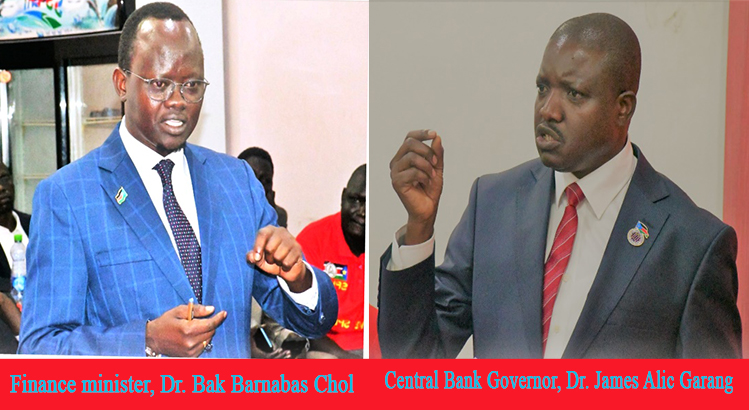By Bida Elly David
South Sudan’s Central Bank and the Ministry of Finance are grappling to stabilize worsening economic crises.
The country’s economy has been experiencing a systematic decline in recent times, casting heavy strain on the national currency to lose value to a record low against the United States Dollar.
Subsequently, the economic unstable situation has culminated to shooting up of commodity prices, in the country.
However, to bail out the country from total economic stupor, two key financial institutions are struggling to explore various indicators and take proactive steps.
The Minister of Finance and the Central Bank of South Sudan have laid strategies to tackle the economic distress, to gouge it out, once and for all.
To achieve this, the two institutions have taken to engage various stakeholders to identify potential solutions, implement policies and initiatives aimed at stimulating economic growth.
Minister of Finance, Dr. Bak Barnaba targets another economic conference, bringing gather experts and stakeholders to brainstorm on key areas that require immediate attention.
Dr. Bak said that the country needs quick measures that can be taken to address challenges affecting various sectors of the economy.
The minister disclosed that a conference set for Saturday this week, is to come up with specific and actionable recommendations that can be implemented to arrest the economic instability.
He said public financial institutions, including the Ministry of Finance, will conduct a one-day drill to communicate their short- and long-term plans for economic stability to the public.
“It is our obligation as people and government to build our country; if we don’t take responsibility seriously, this country will not move anywhere,” Bak said.
Bak acknowledged that the government is doing less to achieve prosperity for the people of South Sudan.
Meanwhile, Central Bank Governor Dr. James Alic Garang, called for unity in addressing the current economic challenges the country is facing, which he attributed to political instability and tribal conflicts.
Dr. Alic said the 2013 and 2016 wars turned South Sudan from grace to grass, ushering in hyperinflation and further exacerbating the economic crisis.
“Those wars destroyed so much of our society, and part of the mess that we see in the economy originated from those conflicts, and this should not be disputed with the leadership,” he said.
“Now that the war is over, the next phase is development, and it needs unity of ideas, consensus, and even debates.”
He spoke yesterday during an event organized by the SPLM Red Army Foundation leadership to award recently appointed SPLM members.
Dr. Alic reiterated that the Bank of South Sudan has been working to implement policies aimed at stabilizing the economy, but progress has been slow due to the complex nature of the challenges facing the country.
He said the Central Bank won’t stabilize the economy as a single institution if people don’t unite and embark on production and agriculture to diversify the economy.
“We need unity, not just looking at a person from Upper Nile, Jonglei, or Equatoria as enemies; it should not be like that. Let us see South Sudan in each of us,” he appealed.
The Central Bank governor further revealed that the Bank of South Sudan and the Ministry of Finance are collaborating to develop effective strategies aimed at implementing positive economic reforms.
The reforms, he said will require the collective unity and cooperation of all citizens to achieve their intended goals.
“The strategies will be used to answer some of the disturbing questions citizens raise about the economy. Some of them are liquidity management, exchange rate reparation, and price stability,” he highlighted.
Governor Alic urged citizens to avoid blanket criticism against them (officials) as heads of financial institutions but maintained that change needed time.
“Remember, Rome was not built in a day, so when we start with reforms, there is a lot; the results will not happen until their time,” he stated.
He reiterated that implementing fiscal and monetary reforms is critical for them, but said that it requires collective support from citizens.
“We as financial institutions cannot push reforms alone; we need each of you, whether from political parties, outside parties, or top leadership, to support us on those difficult reforms,” he underlined.
However, despite the promises made by the financial institutions to stabilize the national economy, the citizens are yet to feel the impact.
But Alic Garang urged South Sudanese to remain hopeful, adding that the central bank will continue to fight against the dollar and stabilize the economy.
“Even if we start tomorrow, you will not expect to see the results of economic transformation immediately,” he hinted.
In October this year, the Central Bank governor acknowledged that the recent market shock is due to the increased salary scale, saying it should not cause any panic.
Dr. Alic reassured the public that a recent increase in market prices and currency exchange rates is under control and under close monitoring.




